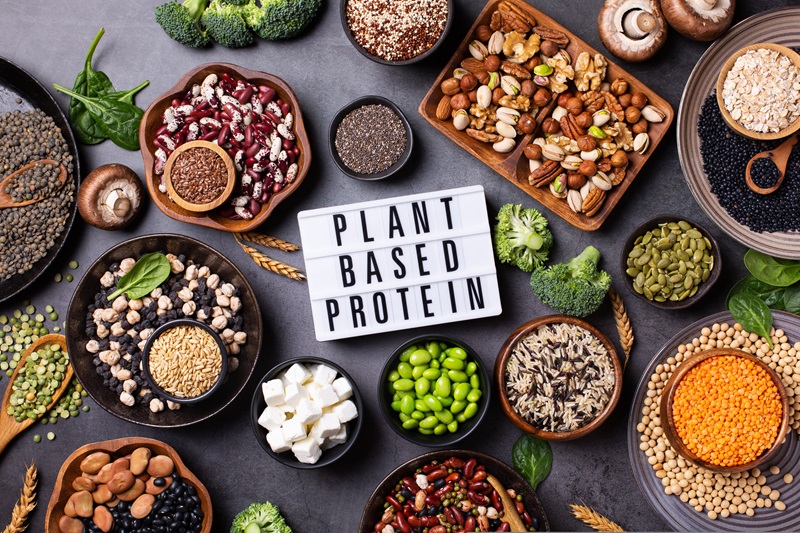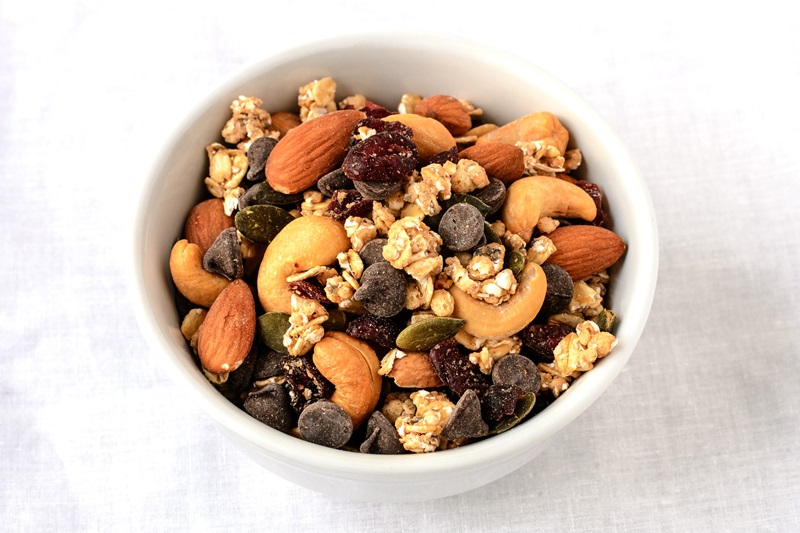Specific nutrients and dietary patterns can influence hormone production and response in your body.
Hormones, the body’s messengers, play a big role in regulating key functions like metabolism and appetite. When these hormones are balanced and your body responds well to their signals, you can enjoy better health and easier weight management. But if your hormones are out of whack, it can lead to issues like weight gain and fatigue.
Here’s some registered dietitian-approved tips for supporting balanced hormones for weight loss through proper nutrition.
1. Reduce Added Sugar Intake

The American Heart Association (AHA) estimates that US adults consume about 17 grams of added sugar daily — more than twice the recommended limit. Excess sugar can disrupt hormonal regulation in several ways.
High sugar intake is linked to insulin resistance. Insulin resistance occurs when your body’s cells become less responsive to insulin, a hormone that helps move sugar (glucose) from your blood into cells for energy. When cells are less responsive to insulin, glucose remains in the bloodstream and is eventually stored as fat, increasing the risk of weight gain and making it harder to lose weight.
Insulin resistance and high sugar intake can also lead to leptin resistance. Leptin is a hormone produced in fat cells that helps regulate appetite. With leptin resistance, your body becomes less responsive to leptin signals, failing to suppress hunger and potentially causing weight gain.
The goal is not to eliminate all sugar but to limit foods high in added sugars that cause rapid blood sugar spikes. The AHA recommends no more than 25 grams of added sugar per day for women and 36 grams per day for men. Check packaged product labels for added sugar content.
Ultimately, you want to start replacing high-added-sugar foods with those with a more moderate impact on blood sugar levels, known as low-glycemic foods. Learn more about the glycemic index.
2. Choose More Healthy Fats

Consuming too much saturated fat, like high-sugar diets, can lead to inflammation and insulin resistance. In contrast, unsaturated fats found in olive oil, avocado and fish can combat inflammation and improve insulin sensitivity.
Certain unsaturated fats have extra perks. For example, Omega-3 fatty acids can help manage cortisol levels during stress. Since cortisol increases food intake and cravings for high-fat and high-sugar foods, keeping it in check may help prevent unwanted body fat and weight gain.
Take a look at your diet for easy swaps. To support hormone health, try using olive oil instead of butter or adding avocado to your sandwich instead of cheese.
Another idea: Use canned fish to make tuna or salmon burgers instead of beef burgers to boost your healthy fat and omega-3 intake. Experts recommend two 3-ounce servings of fatty fish weekly for good health.
3. Boost Your Fiber Intake

Many people aren’t eating enough fiber, which can affect their hormone health. Fiber helps regulate hormone levels by aiding in the excretion of excess hormones through the digestive tract. Without enough fiber, these hormones can be reabsorbed and recirculated in the body.
Fiber also helps maintain insulin sensitivity and improve blood sugar control.
Additionally, many fibers act as prebiotics, feeding beneficial bacteria in your gut. These bacteria can stimulate appetite-regulating hormones, helping you feel full longer and slowing digestion. A healthy gut microbiome is increasingly linked to maintaining a healthy body weight.
Here are some easy ways to add more fiber to your diet:
- Eat at least five one-cup servings of fruits and vegetables every day.
- Choose whole grain bread, cereal and crackers.
- Top salads with seeds, beans or nuts.
- Add flax or chia seeds to cereals, yogurts or smoothies.
- Bake with whole grain flour.
4. Incorporate Plant-Based Proteins

You may know that eating enough protein during weight loss is important to prevent muscle breakdown—but protein also plays a key role in hormonal balance.
Amino acids from proteins are used to produce peptide hormones, which regulate metabolism and energy. These include insulin, GLP-1, ghrelin, leptin and thyroid-stimulating hormones. Meeting protein needs ensures your body has what it needs to make these hormones.
Additionally, protein affects hormone function. In studies, protein-rich meals increase appetite-suppressing hormones like CCK and GLP-1. They also may reduce ghrelin levels, a appetite-stimulating hormone. This helps explain why higher protein diets often lead to better hunger control. Aim for 20 to 30 grams of protein per meal.
Incorporating plant-based proteins into your weight loss plan is a great way to maintain a healthy balance while also boosting fiber intake and limiting saturated fats. Here are some options:
- Beans: ½ cup provides about 7 grams of protein and 120 calories.
- Lentils: ½ cup provides about 9 grams of protein and 115 calories.
- Edamame: ½ cup provides about 9 grams of protein and 90 calories.
- Pumpkin Seeds: ¼ cup provides about 5 grams of protein and 70 calories.
- Chia Seeds: 2 tablespoons provides about 6 grams of protein and 120 calories.
- Almonds: ¼ cup provides about 6 grams of protein and 165 calories.
- Spinach: 3 ½ ounces raw provides about 3 grams of protein and 20 calories.
- Steel Cut Oats: ¼ cup dry provides about 5 grams of protein and 150 calories.
- Peanut Butter: 2 tablespoons provides about 8 grams of protein and 180 calories.
- Unsweetened Soy milk: 1 cup provides about 8 grams of protein and 130 calories.
- Tofu: ½ cup provides about 10 grams of protein and 90 calories.
- Green Peas: ½ cup provides about 4 grams of protein and 60 calories.
- Broccoli: 1 cup provides about 3 grams of protein and 30 calories.
- Quinoa: ½ cup cooked provides about 4 grams of protein and 110 calories.
- Whole wheat pasta: ½ cup cooked provides about 4 grams of protein and 90 calories.
5. Choose Nutrient-Rich Foods

Nutrient-rich foods contain vitamins and minerals essential for hormone production and regulation, like:
- Magnesium: Can help balance hormones by calming the stress response and supporting thyroid function.
- Vitamin D: Acts as a hormonal precursor for calcitriol, which regulates genes affecting endocrine, immune, bone, and metabolic health.
- B-vitamins (B12, B6, B3): Support hormone production, liver function, and reduce inflammation.
- Selenium and Iodine: Necessary for thyroid hormone production.
- Zinc: Helps produce thyroid hormones, is involved in hormone transport, and regulates insulin.
These nutrients are found in foods such as fortified cereals, dairy products, fish, shellfish, beans, nuts, starchy veggies, spinach and dark chocolate.
Consider ways to add more of these foods to your diet. Try starting with snacks by swapping out a snack bag for a trail mix of fortified cereal, nuts and dark chocolate. Another idea is to enjoy tortilla chips with bean dip instead of queso.
After looking at your food choices, if you’re worried about getting enough of these nutrients, talk with your doctor about supplements.
Key Takeaways to Balancing Hormones for Weight Loss
Many factors influence hormone health, but proper nutrition and eating a healthy, balanced diet can support hormone balance and make it easier to reach your weight management goals.
Start by reducing your intake of refined sugars from sweetened beverages, baked goods and snacks. Instead, choose high-fiber fruits and veggies, 100-percent fruit juices, oats and whole-grain cereals instead.
Swap out some saturated fats from processed meats, cheese, butter and beef with unsaturated oils, fish and avocado.
Finally, increase your intake of nuts, seeds, leafy greens, beans and grains to boost your plant-based protein and ensure you get enough vitamins and minerals essential for hormone health. By making these simple changes, you can take significant steps toward avoiding hormone imbalance and achieving sustainable weight loss.
References:
- How Much Sugar Is Too Much? www.heart.org. Accessed June 10, 2024. https://www.heart.org/en/healthy-living/healthy-eating/eat-smart/sugar/how-much-sugar-is-too-much#
- Stanhope KL. Sugar consumption, metabolic disease and obesity: The state of the controversy. Critical Reviews in Clinical Laboratory Sciences. 2015;53(1):52-67. doi:https://doi.org/10.3109/10408363.2015.1084990
- Kumar R, Mal K, Razaq MK, et al. Association of Leptin With Obesity and Insulin Resistance. Cureus. 2020;12(12). doi:https://doi.org/10.7759/cureus.12178
- von Frankenberg AD, Marina A, Song X, Callahan HS, Kratz M, Utzschneider KM. A high-fat, high-saturated fat diet decreases insulin sensitivity without changing intra-abdominal fat in weight-stable overweight and obese adults. European Journal of Nutrition. 2017;56(1):431-443. doi:https://doi.org/10.1007/s00394-015-1108-6
- Abbott KA, Burrows TL, Acharya S, Thota RN, Garg ML. DHA-enriched fish oil reduces insulin resistance in overweight and obese adults. Prostaglandins, Leukotrienes and Essential Fatty Acids. 2020;159:102154. doi:https://doi.org/10.1016/j.plefa.2020.102154
- Madison AA, Belury MA, Andridge R, et al. Omega-3 supplementation and stress reactivity of cellular aging biomarkers: an ancillary substudy of a randomized, controlled trial in midlife adults. Molecular Psychiatry. 2021;26(7):3034-3042. doi:https://doi.org/10.1038/s41380-021-01077-2
- Chao AM, Jastreboff AM, White MA, Grilo CM, Sinha R. Stress, cortisol, and other appetite-related hormones: Prospective prediction of 6-month changes in food cravings and weight. Obesity. 2017;25(4):713-720. doi:https://doi.org/10.1002/oby.21790
- National Institute of Health. Office of Dietary Supplements – Omega-3 Fatty Acids. Nih.gov. Published February 15, 2023. https://ods.od.nih.gov/factsheets/Omega3FattyAcids-HealthProfessional/
- Storz MA. Nutrition facts labels: who is actually reading them and does it help in meeting intake recommendations for nutrients of public health concern? BMC Public Health. 2023;23(1):1947. doi:https://doi.org/10.1186/s12889-023-16859-2
- Gaskins AJ, Mumford SL, Zhang C, et al. Effect of daily fiber intake on reproductive function: the BioCycle Study. The American Journal of Clinical Nutrition. 2009;90(4):1061-1069. doi:https://doi.org/10.3945/ajcn.2009.27990
- Silva FM, Kramer CK, de Almeida JC, Steemburgo T, Gross JL, Azevedo MJ. Fiber intake and glycemic control in patients with type 2 diabetes mellitus: a systematic review with meta-analysis of randomized controlled trials. Nutrition Reviews. 2013;71(12):790-801. doi:https://doi.org/10.1111/nure.12076
- Aoun A, Darwish F, Hamod N. The Influence of the Gut Microbiome on Obesity in Adults and the Role of Probiotics, Prebiotics, and Synbiotics for Weight Loss. Preventive Nutrition and Food Science. 2020;25(2):113-123. doi:https://doi.org/10.3746/pnf.2020.25.2.113
- Noor J, Chaudhry A, Batool S, et al. Exploring the Impact of the Gut Microbiome on Obesity and Weight Loss: A Review Article. Cureus. 2023;15(6). doi:https://doi.org/10.7759/cureus.40948
- Kołodziejski PA, Pruszyńska-Oszmałek E, Wojciechowicz T, et al. The Role of Peptide Hormones Discovered in the 21st Century in the Regulation of Adipose Tissue Functions. Genes. 2021;12(5):756. doi:https://doi.org/10.3390/genes12050756
- Rose AJ. Role of Peptide Hormones in the Adaptation to Altered Dietary Protein Intake. Nutrients. 2019;11(9):1990. doi:https://doi.org/10.3390/nu11091990
- Kohanmoo A, Faghih S, Akhlaghi M. Effect of short- and long-term protein consumption on appetite and appetite-regulating gastrointestinal hormones, a systematic review and meta-analysis of randomized controlled trials. Physiology & Behavior. 2020;226:113123. doi:https://doi.org/10.1016/j.physbeh.2020.113123
- Wang K, Wei H, Zhang W, et al. Severely low serum magnesium is associated with increased risks of positive anti-thyroglobulin antibody and hypothyroidism: A cross-sectional study. Scientific Reports. 2018;8(1). doi:https://doi.org/10.1038/s41598-018-28362-5
- National Institutes of Health. Vitamin D. National Institutes of Health. Published September 18, 2023. https://ods.od.nih.gov/factsheets/VitaminD-HealthProfessional/
- Kennedy D. B Vitamins and the Brain: Mechanisms, Dose and Efficacy—A Review. Nutrients. 2016;8(2):68. doi:https://doi.org/10.3390/nu8020068
- Aktaş H. Vitamin B12 and Vitamin D Levels in Patients with Autoimmune Hypothyroidism and Their Correlation with Anti-Thyroid Peroxidase Antibodies. Medical Principles and Practice. 2019;29(4):364-370. doi:https://doi.org/10.1159/000505094
- National Institutes of Health. Office of Dietary Supplements – Selenium. Nih.gov. Published March 26, 2021. https://ods.od.nih.gov/factsheets/selenium-healthprofessional/
- National Institutes of Health. Office of Dietary Supplements – Iodine. Nih.gov. Published April 28, 2022. https://ods.od.nih.gov/factsheets/Iodine-HealthProfessional/
- Severo JS, Morais JBS, de Freitas TEC, et al. The Role of Zinc in Thyroid Hormones Metabolism. International Journal for Vitamin and Nutrition Research Internationale Zeitschrift Fur Vitamin- Und Ernahrungsforschung Journal International De Vitaminologie Et De Nutrition. 2019;89(1-2):80-88. doi:https://doi.org/10.1024/0300-9831/a000262
- National Institutes of Health. Zinc. Nih.gov. Published September 28, 2022. https://ods.od.nih.gov/factsheets/Zinc-HealthProfessional/
Speak to your doctor before making any changes to your diet or if you have any questions regarding hormone health.

